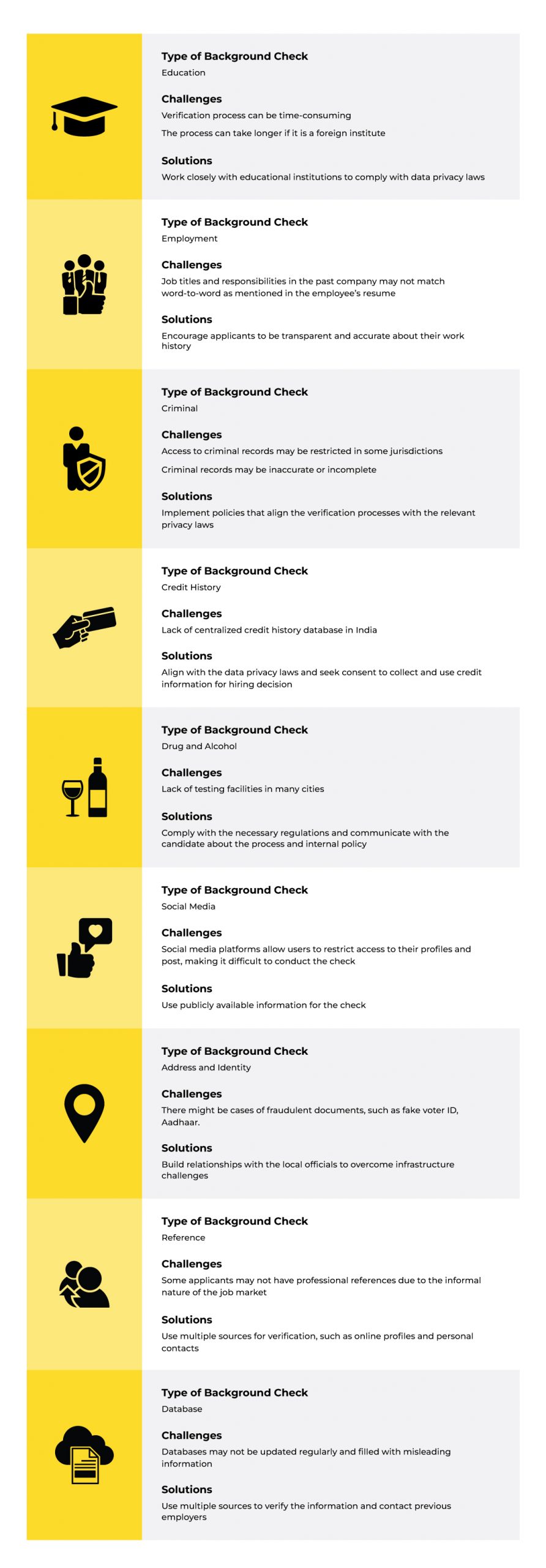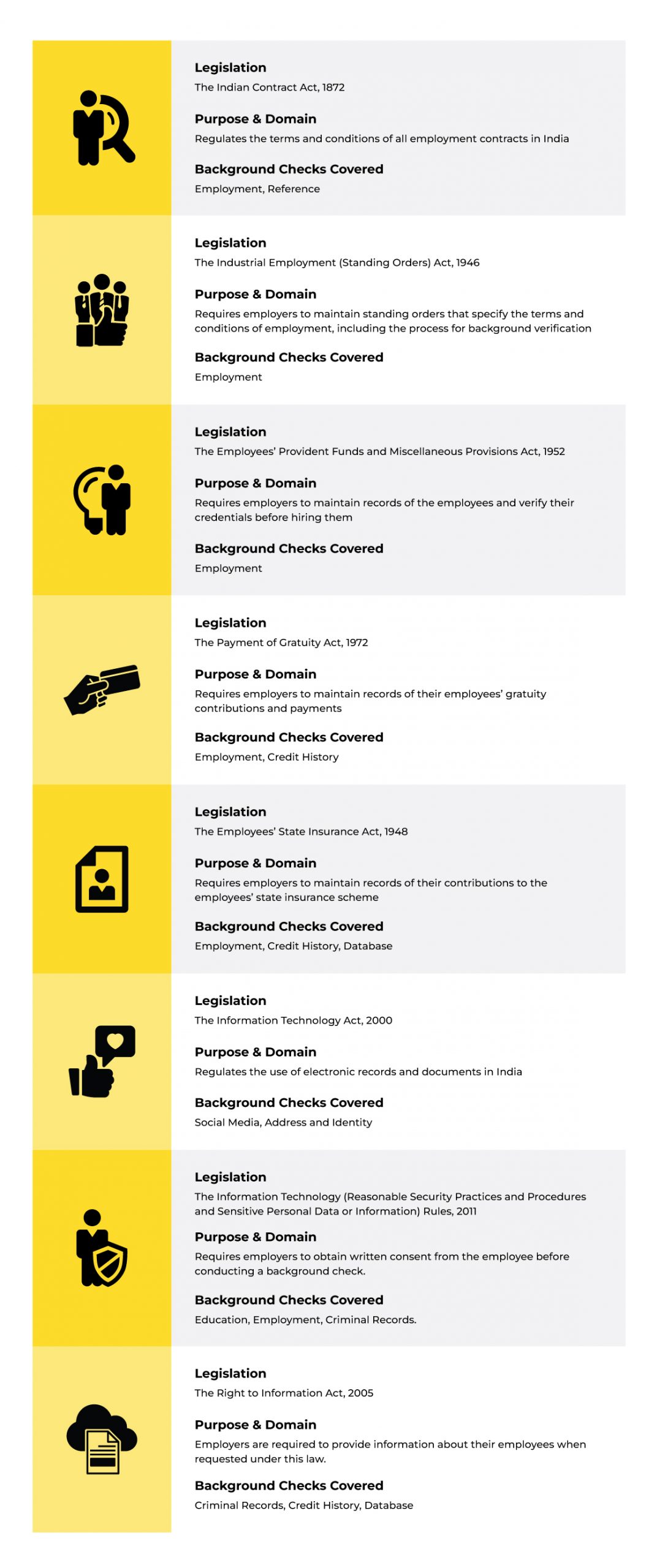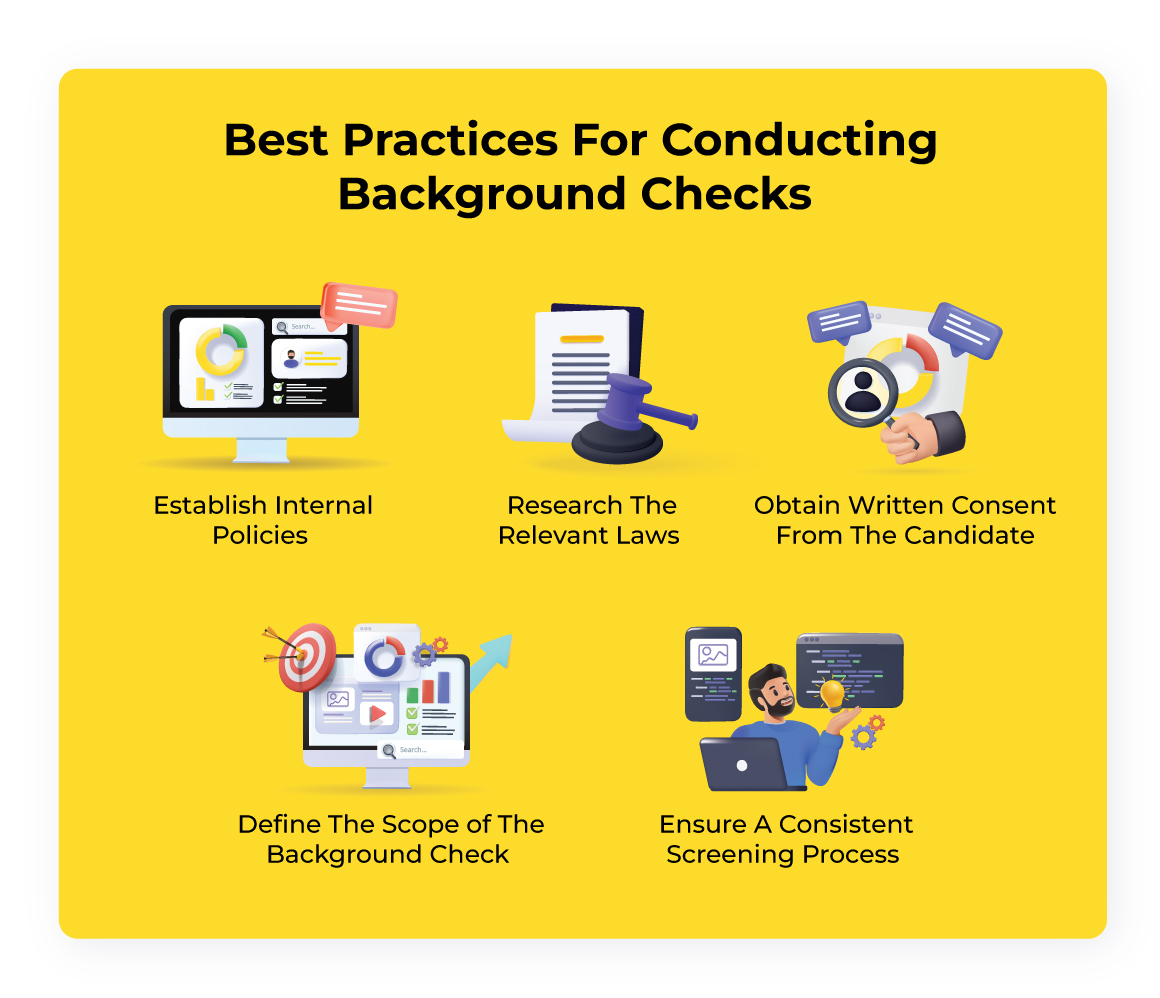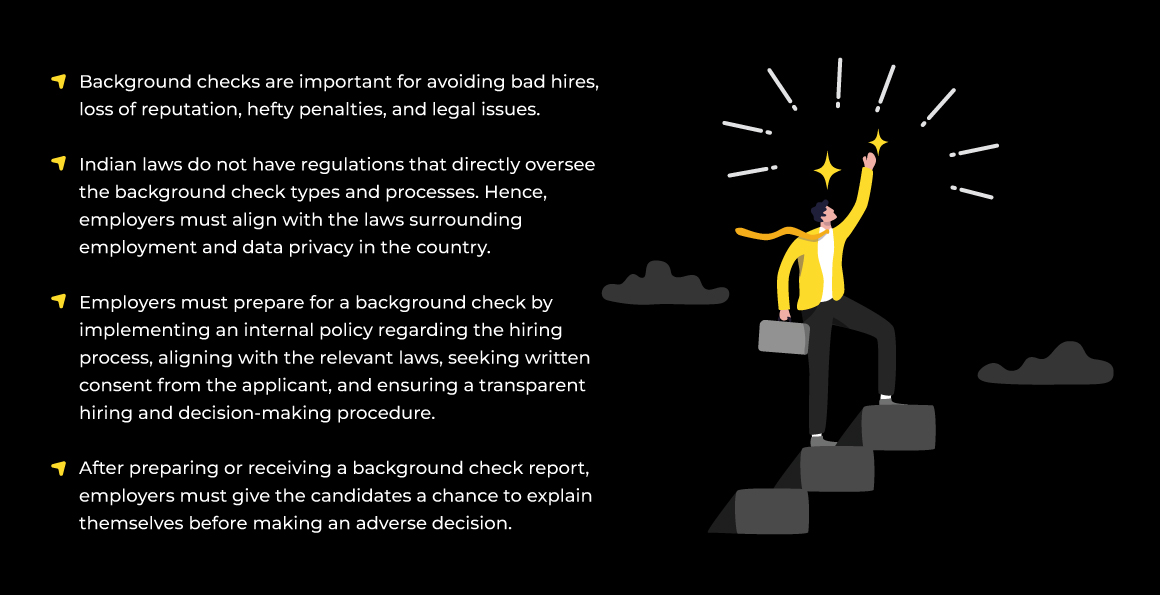The Role of Employee Background Check While Hiring Indian Talents
Deep Dive Into The Propositions And Impact Of Conducting A Background Check
Table Of Content
Executive summary
As per a Deutsche report, India is primed to account for more than a fifth (22%) of the global workforce in the next decade. This is almost 32x more than the growth anticipated for the United States (US) and more than 3x the projected number of all Latin American countries.
This geometric progression of jobs will demand sophisticated hiring procedures that align with global and domestic labor laws. An important aspect of the modern hiring process is employee background check, where employers authenticate the validity of a candidate’s claims in the resume. These checks help employers align with the relevant laws by identifying candidates who can be trusted with sensitive company information.
This white paper encompasses an analysis of how to run a background check on someone for employment, what do employers look for in a background check, the legal landscape, common challenges, and best practices. This paper also outlines the types of employee background checks employers should conduct on their candidates and provides guidance on navigating the challenges involved in these checks.
The goal here is to help employers develop a compliant and reliable employee background check policy in India.
Chapter 1
Introduction
What does a background check show for employment? In the hiring process, employee background checks are a critical component of assessing candidates from different angles, such as their identity, employment history, educational qualifications, and more. These checks are conducted to verify the candidate’s past work experience and the legitimacy of their credentials. After verifying these data, a background check report is compiled that covers the results of the checks in a comprehensive docket.
These checks rely on accessing the candidate’s personal information after obtaining the relevant permissions. For a compliant verification and hiring process, there must be regulations that protect the candidate’s confidential data from misuse and misrepresentation.
However, India lacks dedicated laws overseeing employee background check of job applicants, which is indicative of two things –
- The fact that background checks are not mandatory for hiring a professional
- The candidate’s private information must be protected by other laws that indirectly impact the background check.
The scenario is completely contrasted in the far west, as the United States has a set of federal and state laws that directly oversee the background checks and the use of the candidate’s information. Furthermore, there are regulations that US companies must abide by when they run background checks for employees via private vendors. Companies that do not adhere to these rules and hire employees with a risky background have to pay hefty fines and hamper their brand image.
The following table presents the laws applicable in India and the US for conducting background checks:
| Types of Background Checks | Indian Legislations | US Legislations |
| Education | The Information Technology (Reasonable Security Practices and Procedures and Sensitive Personal Data or Information) Rules, 2011 | Family Educational Rights and Privacy Act (FERPA) Equal Employment Opportunity Commission (EEOC) State Laws (Investigative Consumer Reporting Agencies Act (ICRAA)) |
| Employment | The Indian Contract Act, 1872 The Employees’ Provident Funds and Miscellaneous Provisions Act, 1952 Industrial Employment (Standing Orders) Act, 1946 The Information Technology (Reasonable Security Practices and Procedures and Sensitive Personal Data or Information) Rules, 2011 The Payment of Gratuity Act, 1972 The Employees’ State Insurance Act, 1948 | Fair Credit Reporting Act (FCRA) Title VII of the Civil Rights Act Americans with Disabilities Act (ADA) State Laws |
| Criminal Records | The Information Technology (Reasonable Security Practices and Procedures and Sensitive Personal Data or Information) Rules, 2011 The Right to Information Act, 2005 | Fair Credit Reporting Act Title VII of the Civil Rights Act Equal Employment Opportunity Commission (EEOC) State Laws |
| Credit History | The Information Technology (Reasonable Security Practices and Procedures and Sensitive Personal Data or Information) Rules, 2011 The Payment of Gratuity Act, 1972 The Employees’ State Insurance Act, 1948 | Fair Credit Reporting Act (FCRA) Equal Employment Opportunity Commission (EEOC) State Laws |
| Drug and Alcohol | The Information Technology (Reasonable Security Practices and Procedures and Sensitive Personal Data or Information) Rules, 2011 | Americans with Disabilities Act (ADA) Drug-Free Workplace Act State Laws |
| Social Media | The Information Technology Act, 2000 The Information Technology (Reasonable Security Practices and Procedures and Sensitive Personal Data or Information) Rules, 2011 | Fair Credit Reporting Act (FCRA) Equal Employment Opportunity Commission (EEOC) State Laws |
| Address and Identity | The Information Technology Act, 2000 The Information Technology (Reasonable Security Practices and Procedures and Sensitive Personal Data or Information) Rules, 2011 | Fair Credit Reporting Act (FCRA) Immigration Reform and Control Act (IRCA) State Laws |
| Reference | The Indian Contract Act, 1872 The Information Technology (Reasonable Security Practices and Procedures and Sensitive Personal Data or Information) Rules, 2011 | Fair Credit Reporting Act (FCRA) Equal Employment Opportunity Commission (EEOC) State Laws |
| Database | The Right to Information Act, 2005 The Information Technology (Reasonable Security Practices and Procedures and Sensitive Personal Data or Information) Rules, 2011 The Employees’ State Insurance Act, 1948 | Fair Credit Reporting Act (FCRA) Equal Employment Opportunity Commission (EEOC) State Laws |
While the legal frameworks of both countries are different, the process of conducting the background check is similar.
Checklist of activities in a typical employee background check:
- Gain written consent from the employee
- Gather relevant documents; share the documents with the background check vendor, if conducting externally
- Contact the relevant authorities and individuals, document their feedback
- Prepare a report based on the feedback
- Review the report with the relevant committee
- If any red flags demand an adverse step, connect with the applicant, share the report and ask for an explanation
- Proceed with hiring if the profile is suitable
As per the Professional Background Screening Association (PBSA), 94% of global companies conduct background checks when looking to hire remotely. Recruiters who do not conduct background checks make way for serious legal and compliance issues that hamper their organization’s image and financials.
Chapter 2
Legal and Compliance Risks of Background Checks
In 2017, JP Morgan Chase & Co, a large-scale multi-national investment bank, was fined USD 1.25 million by The Financial Industries Regulation Authority for not conducting background checks on 8,600 employees.
As evident from this example, not conducting employee background check can leave employers open to several risks, such as:
Reputation and Brand Image Risks
Hiring an employee without verification can tarnish the trust and credibility of the company. The news of bad hiring can spread quickly through news outlets and social media, inflicting more damage to the company. Additionally, there can be legal consequences, such as lawsuits and fines.
Financial and Operational Risks
When it comes to criminal background checks for employment, it’s crucial to consider the potential risks associated with hiring a candidate with a history of fraud and embezzlement. Such individuals can cause significant financial losses to the company in the form of penalties, which may require the organization to allocate additional resources to deal with the aftermath. Ultimately, this can impact all other operations within the company.
Security and Data Privacy Risks
If an employee hired without conducting background checks gains access to sensitive company information, it may result in data theft, loss of intellectual property, and legal conundrums. Failure to conduct background checks for employment also counts as a compliance issue in some countries, including the US.
A risk assessment matrix can give us a clearer view of the possible dangers of not conducting a background check. The matrix below pitches the probability of risks vs. the severity of damage to perceive the degree of risk.
Legends:
| Probability | Severity | Degree of Risk |
| 1: Risks in this category are highly unlikely. 2: Uncommon risks that have a small probability. 3: Risks that have a 50-50 chance of materializing. 4: Risks that are definitely going to occur. | Minor: Risks that have little impact on the company. Moderate: Risks that may have a slightly negative impact. Major: Risks that can impact projects but not operations. Critical: High-priority risks that will impact the whole company and daily operations | Low: Can be resolved later Medium: Does not require a lot of attention, can be resolved easily High: Needs immediate attention and resolution |
Risk Assessment Matrix:

Using these risk assessment matrix, there can be a variety of scenarios:
- Low Probability / Low Impact: Risks of such degree do not require immediate attention.
For example: Skipping an education check for a position that does not mandate an academic qualification.
- High Probability / Low Impact: Such risks can be managed as soon as they occur as they are of low impact.
For example: Skipping a reference check for a low-level position with limited access to company data.
- Low Probability / High Impact: Such events must be prevented even though they have a low probability. Prepare contingency plans to ensure they never occur.
For example: Skipping criminal records checks for a high-level position.
- High Probability / High Impact: Such risks need immediate attention as they can impact daily operations and tarnish the brand image heavily.
For example: Skip all employee background checks while hiring a C-level employee.
At Uplers, we use a reliable hiring process that ensures the talent is the right match for your organization. Aligning with this value, we always go beyond technical and behavioral checks, and also run a background check of the talent. With our background check partner OnGrid, we ensure the basic checks, viz. Identification, Address, and Criminal History, and also accommodate additional check requests.
Chapter 3
Preparation Before Conducting Background Checks
When it comes to conducting employee background checks for employment, it’s essential to define the scope of the check pertaining to your organization and the job role before proceeding with tasks like obtaining written consent and gathering necessary documents. The check’s scope can guide you on the type of information you need and can assist in creating a report on the candidate, determining their suitability for the vacancy. So, how long does a background check take for employment? Well, that can vary based on the scope of the check and the resources available to the employer conducting it.
A reliable way to identify the scope of the employee background check is by using the four Ws:

After defining the scope of the background check, it is time to ask for written consent from the applicant and then conduct the checks.
Conducting a background check for employees can be time-consuming if you are doing it internally. An external vendor will be more convenient, as highlighted in the steps mentioned below:

If you have conducted the background check internally, it is advised to prepare a report similar to the one below:

Chapter 4
Types of Background Checks for Remote Indian Employees
An employer can conduct the following types of background checks for employees in India:
| Type of Background Check | Challenges | Solutions |
| Education | The verification process can be time-consuming The process can take longer if it is a foreign institute Educational institutions may require a signed release from the applicant before sharing information A fraudulent document is difficult to verify Name variations in the document make it complex to verify the data An institute may lose the applicant’s data | Work closely with educational institutions to comply with data privacy laws Implement policies that require the applicant to provide official documents with the official seal of the institute to reduce cases of fraud Partner with a reputable background check vendor |
| Employment | Some employers may hesitate to provide their workforce details as part of their policies or legal concerns Job titles and responsibilities in the past company may not match word-to-word as mentioned in the employee’s resume Multiple employers in the work history make this check time-consuming | Encourage applicants to be transparent and accurate about their work history Implement policies that require applicants to provide contact details of their past employers Conduct reference checks with former colleagues or supervisors Partner with a reputable background check vendor |
| Criminal | Access to criminal records may be restricted in some jurisdictions Criminal records may be inaccurate or incomplete Criminal records are regulated by state and national laws and complying with all of them is necessary while conducting background checks | Implement policies that align the verification processes with the relevant privacy laws Conduct multi-level criminal record checks at district, state, and national levels Stay up-to-date with the necessary laws and regulations |
| Credit History | Lack of centralized credit history database in India Access to the current database is limited to authorized entities Credit reports may contain errors due to lack of standardization in reporting practices Credit history information is sensitive information and subject to data privacy regulations | Align with the data privacy laws and seek consent to collect and use credit information for hiring decision Use credit history checks selectively, preferably if the position requires handling the employer’s financial transactions Educate the applicants about the reason for conducting the credit check and provide full transparency in the process |
| Drug and Alcohol | Lack of testing facilities in many cities Drug and alcohol tests are considered personal information, making the employee hesitant in the process The test may return false positive results due to various reasons | Partner with third-party vendors who have the infrastructure for drug and alcohol tests Comply with the necessary regulations and communicate with the candidate about the process and internal policy Use testing methods less prone to false positives and consider retesting to ensure accuracy |
| Social Media | Social media platforms allow users to restrict access to their profiles and post, making it difficult to conduct the check Social media profiles may contain inaccurate information Social media checks can raise concerns over bias and discrimination regarding the applicant’s race and ethnicity | Use publicly available information for the check Cross-check the social media information with the candidate’s education and employment verification results Implement policies regarding a non-discriminatory stance regarding the social media check and share its copy with the applicant |
| Address and Identity | There might be cases of fraudulent documents, such as fake voter IDs, Aadhaar, or passports India has a diverse population with numerous languages, making it complex to verify documents in local languages Address checks in rural areas can be time-taking and confusing without local help | Verify identity documents by cross-checking them against government database and using biometric identification Use translation software and mobile apps that help streamline the background check process Build relationships with local officials to overcome infrastructure challenges |
| Reference | Some applicants may not have professional references due to the informal nature of the job market Past employers may hesitate to provide references due to cultural norms or fear of legal liability Contacting multiple past employers can be time-consuming | Develop a clear reference policy as an employer that provides guidelines on what information can be disclosed Use multiple sources for verification, such as online profiles and personal contacts |
| Database | Databases may not be updated regularly and may be filled with misleading information India has very limited databases, and their access is exclusive to a few entities India has strict data privacy laws surrounding the access and use of personal information Small businesses may have limited information in databases | Use multiple sources to verify the information and contact previous employers Use a combination of checks that include court records and media searches Comply with the data privacy laws and obtain consent from the applicant before conducting the check. |
TL, DR:

Chapter 5
Indian Regulatory Framework for Employee Background Check
As discussed above, there are no regulations in India directly governing background checks for employees. Hence, employers and business vendors must align with the laws that protect the privacy of sensitive information and the rights of the candidate.
A bench of nine judges in the Hon’ble Supreme Court (SC) were constituted to debate if privacy is a fundamental right. On 24 August 2018, the bench unanimously declared that the right to privacy is essential for the right to life and personal freedom as per the Article 21 of the Constitution of India.
To protect the privacy rights of the candidate and ensure a compliant hiring process, recruiters must abide by the following legislations:
| Legislation | Purpose & Domain | Background Checks Covered |
| The Indian Contract Act, 1872 | Regulates the terms and conditions of all employment contracts in India | Employment, Reference |
| The Industrial Employment (Standing Orders) Act, 1946 | Requires employers to maintain standing orders that specify the terms and conditions of employment, that include the process for background verification | Employment |
| The Employees’ Provident Funds and Miscellaneous Provisions Act, 1952 | Requires employers to maintain records of the employees and verify their credentials before hiring them | Employment |
| The Payment of Gratuity Act, 1972 | Requires employers to maintain records of their employees’ gratuity contributions and payments | Employment, Credit History |
| The Employees’ State Insurance Act, 1948 | Requires employers to maintain records of their contributions to the employees’ state insurance scheme | Employment, Credit History, Database |
| The Information Technology Act, 2000 | Regulates the use of electronic records and documents in India | Social Media, Address and Identity |
| The Information Technology (Reasonable Security Practices and Procedures and Sensitive Personal Data or Information) Rules, 2011 | Demands employers to obtain written consent from the employee before conducting a background check, and retaining the ‘sensitive personal data or information’ for as long as necessary and removing the data after termination | Education, Employment, Criminal Records, Credit History, Drug and Alcohol, Social Media, Address and Identity, Reference, Database |
| The Right to Information Act, 2005 | Provides individuals access to information held by public authorities. Employers are required to provide information about their employees when requested under this law. | Criminal Records, Credit History, Database |
TL, DR:

Even slight deviation from the aforementioned legislation will lead to legal issues and hamper the recruiter’s brand image. Therefore, optimizing the employee background check and hiring challenges & processes with these laws in mind is important.
Uplers aligns with the above-mentioned legislations while helping businesses hire the best remote Indian talent. As part of our process, we always seek written consent from the talent before conducting a background check and ask for their documents for verification. We also provide a disclaimer that the final report will be instrumental in making the hiring decision. Once we obtain the consent and documents, we share them with OnGrid, who conducts the background check and shares the final report.
Chapter 6
The Cost-Benefit Analysis With Case Studies
A background check leads to a compliant hiring process and a reliable workforce that aligns with the organization’s interests. However, there is also a financial advantage of running these checks.
The table below reveals the cost of conducting an online background check for employment in India:

As per the table above, the cost of conducting a background check in India is USD 41 – 91.
The following section discusses the impact of negligent hiring activities due to lack of employee background check:
Education Check
Cost of the Check: USD 8 – 32
Incident of Negligence: In 2012, it was discovered that Scott Thompson, the then CEO of Yahoo, had falsely claimed to have earned a computer science degree from Stonehill College on his resume and public statements. The discovery was made by a shareholder activist, who found that Thompson had a degree in accounting, not computer science.
Impact: This revelation led to Thompson’s resignation from Yahoo, as well as public backlash and legal action against the company for negligence in their hiring process. The incident damaged Yahoo’s credibility and reputation, and underlined the importance of conducting a thorough personal background check for employment.
Criminal Record Check
Cost of the Check: USD 5 – 12
Incident of Negligence: Uber hired Jason Dalton as a driver, who went on a shooting spree in 2016, in Kalamazoo, Michigan. It was later discovered that Dalton had a criminal record, including charges for assault and weapons violations. Apparently, Uber hired Dalton without conducting a criminal record check and was unaware of his criminal history.
Impact:In the wake of the incident, there was a public outcry and serious concerns raised about the company’s recruitment procedures, which prompted the implementation of criminal background checks for employment. The incident also brought about increased scrutiny of the gig economy and the accountability of companies like Uber to uphold the safety of their customers.
Identity Check
Cost of the Check: USD 1- 6
Incident of Negligence: Rachel Dolezal was hired as an instructor of African-American studies at Eastern Washington University (EWU) in 2014. Dolezal had presented herself as a woman of color, which was later found to be untrue. Investigations concluded that she lied about her racial identity multiple times in her past.
Impact: The incident sparked public outrage and raised questions about the hiring practices of the EWU, and if thorough background checks are conducted before hiring instructors. It also led to scrutiny of individuals who misrepresent their racial or ethnic backgrounds for selfish reasons.
Negligence in conducting a background check during hiring can have an adverse impact on an organization’s outlook. Hence, these checks should be considered an investment towards a strong-valued workforce and not simply an expense in the balance sheet.
Chapter 7
Best Practices for Conducting Employee Background Checks
Conducting an employment background check judiciously is the duty of the employer and the vendor. Even a slight failure can result in liability for privacy violations, hiring discrimination, and much more.

The best practices below are helpful tips for ensuring a compliant employee background check that protects the interests of both employer and employee:
1. Establish Internal Policies
The first step before screening a candidate is developing internal policies surrounding the checks. The policies should outline the process of background checks and all the laws they align with. The employer should also share a copy of these policies with the candidate to give them an idea of the hiring guidelines and procedures.
2. Research The Relevant Laws
It is crucial to ensure that your HR and legal team is knowledgeable about the relevant regulations related to background check for pre-employment. If you are conducting the checks internally, ensure that your verification processes comply with the necessary rules to avoid any legal risks. In case you are working with an external vendor, ask them about their processes, the laws they follow, and their successful case studies.
3. Obtain Written Consent From The Candidate
The Information Technology Act, 2000 and The Information Technology (Reasonable Security Practices and Procedures and Sensitive Personal Data or Information) Rules, 2011 demand employers obtain written permission from the candidate before beginning the background check. The employer should also notify the candidate that the final report will be used to make hiring decisions.
4. Define The Scope of The Background Check
Employers should have a clear understanding of what type of online background check for employment they need to conduct to accurately evaluate a candidate’s suitability for a position.Background checks can be costly, depending on the vendor, and time required. Hence, it is essential to outline the important details of the candidate that will impact the hiring decision.
5. Ensure A Consistent Screening Process
The screening process in the organization must be consistent for every candidate and job role. Conducting a background check for a few roles and avoiding them for others highlights discrimination, which can lead to legal implications.
To avoid such a scenario and maintain a clean brand image, it is necessary to treat all applicants fairly and subject them to the same screening process.
These practices form the core of Uplers’ ethos to deliver an optimized hiring cycle without compromising on the quality of the talent. Our hiring cycle aligns with all the relevant employment laws for zero compliance issues. We also educate and assist our clients about the internal policies and regulations to maintain for a hassle-free hiring experience.
Conclusion
Everything You Need To Know For Your First Employee Background Check
Conducting background check for employment in India is essential to make informed hiring decisions and ensure the safety of the workplace. While there are challenges to conducting employee background check in India, such as limited databases and privacy laws, employers can overcome them by using multi-level checks, complying with the regulations, and leveraging technology to simplify the process.

Many businesses wonder how long do background checks take for pre-employment and spend a lot of effort in setting up internal teams and processes for the same. A smarter way to streamline the process is to collaborate with third-party vendors who specialize in providing background check services to employers. In addition, some of these private vendors also offer global background check services to cater to the needs of companies with remote teams.
For a comprehensive background check for employment in India, it is advised to partner with one of the most reputable companies that do background check services for employers – OnGrid. OnGrid has the experience and expertise to navigate India’s complex regulatory landscape and vet the profiles in an expansive manner. Consequently, employers can mitigate risks associated with inaccurate information, data privacy, and legal hurdles while protecting their reputation and brand image.
With Uplers by your side, hiring remote Indian talent is a breeze. Our talent network consists of 50,000+ professionals across various disciplines ready to be onboarded. We also vet the talent for smooth communication, high aptitude, technical proficiency, and a clean background. Consequently, we have helped global companies hire 10x faster and 40% cost-effective talent.
If you want to ace your hiring process in India, download this ebook and find out how Uplers has optimized the remote hiring cycle.












